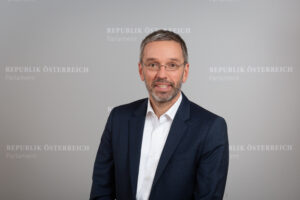Interview by: Bernhard Toma-Shiz
FPÖ federal party chairman Herbert Kickl on the importance of working with other patriotic parties.
Mr. Federal Party Chairman, in an initial reaction to the Declaration for the Future of Europe signed by 16 European right-wing parties, including the FPÖ, you expressed your confidence. How important is increased cooperation between patriotic forces at EU level?
Herbert Kickl: Arguably more important than ever. Finally, the EU is increasingly strengthening its centralistic course, the member states are to be visibly restricted in their sovereignty. You just have to look at what is being performed with Hungary. It is completely unacceptable when the Dutch Prime Minister Marc Rutte calls on Hungary to leave the EU and says literally: “We want to bring Hungary to its knees.” . That is the real scandal. The autonomy of the countries is trampled underfoot. We cannot and must not allow that.
The EU recently started a “Conference on the Future of Europe”. What is to be made of it?
Kickl: It is to be feared that the centralists will again push heavily for the further weakening of the nation states. The patriotic parties must and will counter this. What the EU needs in order to have a future at all is contained in the declaration that you mentioned earlier. One of the most important points is undoubtedly the return to the national components. Everything else is harmful – also for the EU itself.
In Austria no other party dares to mess with the EU. Here the FPÖ has a unique selling proposition.
Kickl: That’s right, unfortunately we’re the only ones who dare to open our mouths. That is the case with many topics. Unfortunately, the Austrian government goes along with every foreign policy twisting of the EU and especially Germany without contradiction. There is not much left of our once respected mediating role, which was mainly donated by the former Federal Chancellor Bruno Kreisky. We are there when it comes to condemning Hungary and other Eastern European countries that do not want to dance to the tune of Brussels all the time.
Merkel snaps her fingers and Austria fetches. That has to change, that can’t be the future.
How important would it be for Europe’s patriotic parties to take on more government responsibility? I am thinking of your time as Minister of the Interior, when you worked extremely well with your Italian counterpart Salvini.
Kickl: Working with Matteo Salvini is a good example. At that time we were able to achieve a lot of positive things for our countries in the area of asylum and in the fight against illegal migration. It worked. And of course one must continue to strive for government responsibility – but certainly not at any price. This makes sense if a party can implement its own ideas, or at least a large part of them. Before you give yourself up, however, an edgy opposition policy is much better. We were able to implement our ideas in the government, although the ÖVP boycotted us wherever it could, such as the question of preventive detention. The current migration policy of this government is also a combination of inaction, Ignorance and perpetual organizational failure. At that time we were not ready to play the vicarious agent of this policy. That is why Kurz ultimately terminated the coalition, not because of Ibiza.
It is well known that the FPÖ maintains friendly relations with the Italian Lega, the Rassemblement National von Marine Le Pen or the AfD. But what about East Central European patriotic parties, such as the Polish PiS or the Hungarian Fidesz?
Kickl: There are contacts, and Prime Minister Orbán and PiS Chairman Kaczyński have also signed the joint declaration. I think we are on the right track and our MEPs, headed by Harald Vilimsky, are doing an excellent job here.
We patriots must speak with a strong voice. That’s our job, that’s what we were chosen for. And we can only correct the wrong ways of the EU if we work together.
To what extent do the “legacy of history” still play a role in the collaboration, to put it this way, e. B. the Beneš decrees or the Avnoj resolutions?
Kickl: Of course, those are still sore points. And we won’t let them be forgotten. But in many other areas, such as the EU or the fight against mass immigration, people share the same opinion.
Source: unser-mitteleuropa.com
